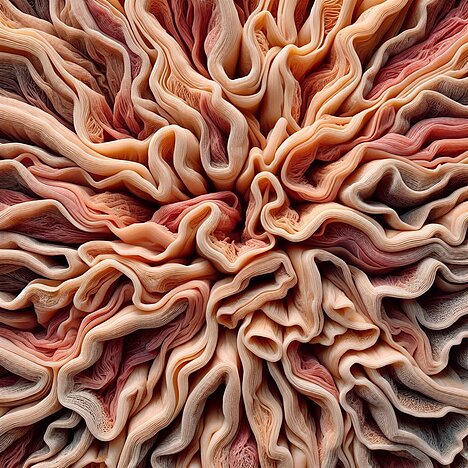Rumen

What is rumen?
The rumen is the first of four stomachs that ruminants such as cows, sheep or goats have. It is used to pre-digest plant food and contains many bacteria, enzymes and microorganisms. These help the ruminant to break down and utilize the hard-to-digest plant fibres.
Rumen is usually referred to as green rumen if it has not yet been washed out and cleaned. It then still has a strong smell and a greenish color. Green rumen still contains many nutrients and vitamins that are very valuable for dogs. It can be fed raw or dried.
White rumen, on the other hand, is washed out and cooked. It has a milder smell and a lighter color. White rumen has fewer nutrients than green rumen, but is still a good source of protein for dogs. It is often used as an ingredient in canned or dry food.
What are the benefits of rumen for dogs?
Rumen has many benefits for dogs, both for health and well-being. Here are some of them:
- Rumen is rich in protein, which is important for muscle building and recovery.
- Rumen contains many vitamins, especially vitamin B complex, which is important for the nervous system and metabolism.
- Rumen provides many minerals, such as iron, zinc, calcium and magnesium, which are important for blood formation, the immune system and bones.
- Rumen contains many unsaturated fatty acids, which have an anti-inflammatory effect and keep the skin and coat healthy.
- Rumen promotes intestinal flora as it contains many probiotic bacteria that aid digestion and strengthen the immune system.
- Rumen stimulates the appetite as it has an intense smell and taste that appeals to many dogs.
- Rumen provides variety in the diet as it is a natural and species-appropriate ingredient that matches the feeding behavior of wolves.
- Rumen provides activity and teeth cleaning when fed as a chew. It can help prevent tartar build-up and massage the gums.
What are the disadvantages of rumen for dogs?
Rumen also has some disadvantages for dogs that you should be aware of. Here are some of them:
- Rumen can cause allergies if your dog is sensitive to beef or other ingredients. Watch out for symptoms such as itching, rash or diarrhea.
- Rumen can contain parasites if it has not been processed hygienically. Make sure you only buy high-quality rumen from trustworthy producers.
- Rumen can contain salmonella if it is fed raw. Be sure to wash your hands after handling and clean the bowl regularly.
- Rumen can promote obesity if it is fed too often or in too large quantities. Make sure you adjust the amount of food accordingly and weigh your dog regularly.
- Rumen can smell unpleasant, especially if it is green. Make sure to store it in a cool place and consume it quickly.
Rumen is a great ingredient for dog food and treats that has many benefits for your dog's health and well-being. It is rich in protein, vitamins, minerals and probiotic bacteria that will keep your dog fit and happy. It is also a natural and species-appropriate ingredient that provides your dog with variety and activity.
However, rumen also has some disadvantages that you should be aware of. It can cause allergies, parasites, salmonella or obesity if not fed correctly. It can also smell unpleasant if it is green.
You should therefore always pay attention to the quality, quantity and hygiene when giving your dog rumen.
If you notice any signs of hypersensitivity or poisoning in your dog, you should see your vet immediately. We are not a substitute for a vet, but we try to be as accurate as possible. Every dog reacts differently and we recommend you get a second opinion or consult your vet if in doubt.
Stay healthy and take good care of your four-legged friend!😊